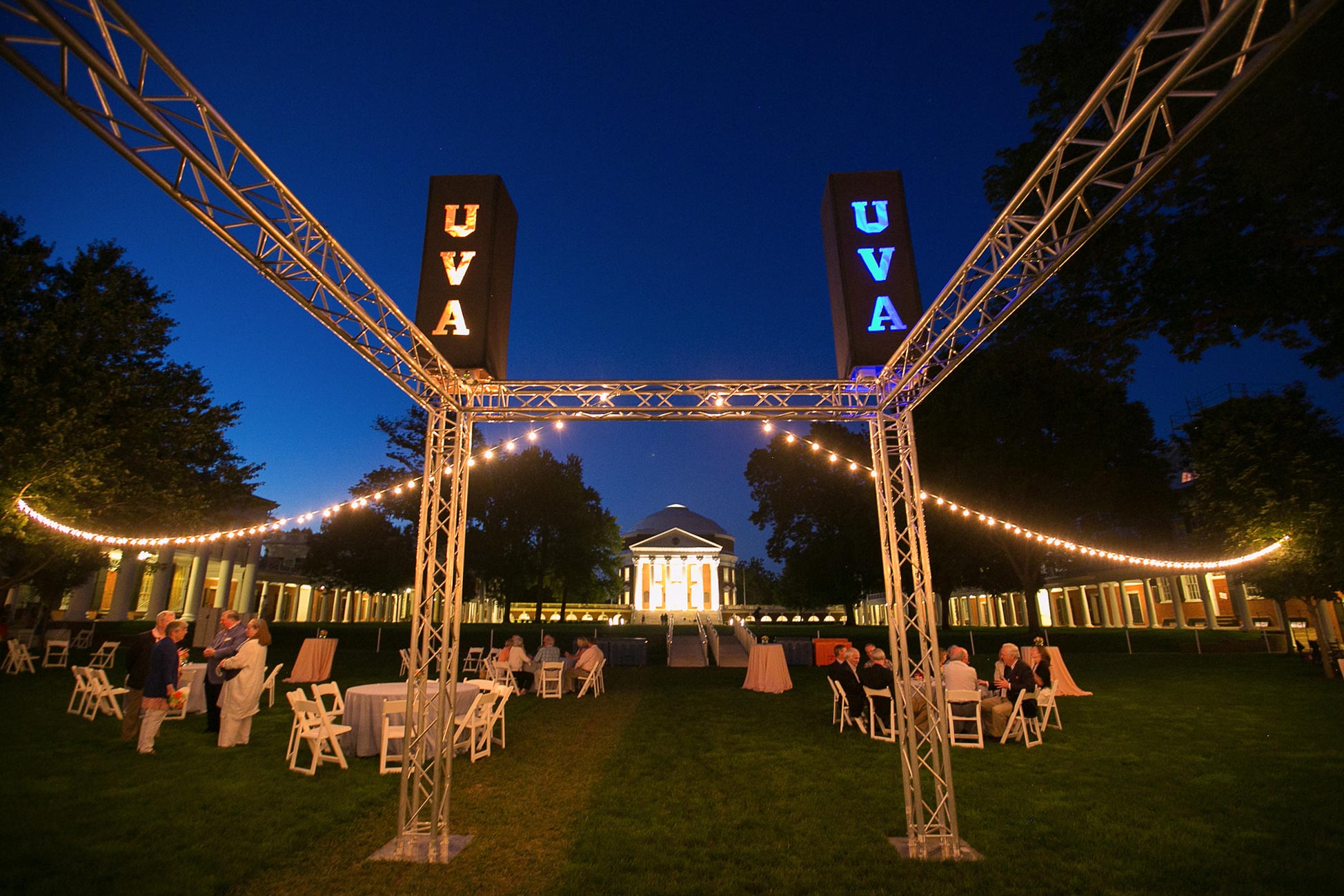Over the first two weekends of June, more than 5,200 University of Virginia alumni and their guests descended on Grounds to celebrate their class reunions.
They reconnected with friends, held class dinners all over Grounds, snapped selfies with national championship trophies, met UVA President Jim Ryan and made mad dashes for Bodo’s bagels.
And, they kept the environmental impact of all that activity to a bare minimum.
UVA’s Facilities Management division and its Office for Sustainability partnered with the Alumni Association on 29 events over the two weekends, aiming to make each “zero waste,” with at least 90% of the waste generated either recycled or composted.
The plates, utensils and napkins at those huge class dinners were compostable. The cups, raised high to toast old friends, were too.
Over the first weekend, approximately 30 bins of material were saved from the landfill, each one about the size of a large recycling bin you might wheel out to the street at home.
That’s about 1,804 pounds according to Eric Walter of Black Bear Composting. Numbers are anticipated to be even higher for the second weekend, although Walter and his team are still tallying those up.
All of it will be turned into nutrient-rich dirt, some of which ends up in gardens back on Grounds.
“The visible impact at big events like this always hits me,” said Dana Schroeder, outreach and engagement specialist in the Office for Sustainability. “You see these huge events, and then you see just a few bags of waste, with everything else ready to be composted. It’s amazing.”
“A simple catered event can generate a lot of waste. As our events are large and complex in scale, and require coordination with multiple caterers, effectively factoring in a layer of sustainability was something we could not do alone,” Savannah Schuermann, assistant director of alumni events, said. “With the support of the Office for Sustainability and UVA Facilities Management, we now have the confidence and experience to make zero waste the standard for our large-scale reunion events.”
Reunions, which were held this year for the Classes of 1959, 1964, 1969, 1974, 1979, 1984, 1989, 1994, 1999, 2004, 2009 and 2014, are far from the only UVA events to strive for that “zero waste” goal.
Last year’s farewell picnic for outgoing UVA President Teresa Sullivan was a zero-waste event, and the Office for Sustainability partners with the Athletics Department for annual zero-waste football and basketball games. Dozens of student volunteers work at those games, reaching out to tailgaters, collecting recyclable and compostable material inside the venues and educating attendees. As at the Reunions events, UVA’s Facilities Management division and its UVA Recycling service plays a huge role in setting up and breaking down each event and making sure as much material as possible is recycled.
Schroeder also emphasized that small events are just as important as big ones. Her office partners with staff and faculty members across the University to reduce waste at conferences, department events, lunches, meetings and other gatherings.
“We help support everything from huge cross-University events to small training events or lunches,” she said. “Events at all levels are important for meeting the big goals UVA has set.”
UVA launched a comprehensive Sustainability Plan in 2016, with initiatives to reduce waste, invest in solar energy, reduce greenhouses gases and much more.
As of October 2018, the University had reduced its greenhouse gas emissions by 19% – part of a targeted 25% reduction by 2025. Approximately 21% of UVA’s electricity is solar-powered, and 52 buildings across Grounds hold certification through Leadership in Energy and Environmental Design, or LEED, including the Rotunda. All new buildings must be certified at the Silver LEED level, at minimum.
(Read also: 10 Ways UVA Plays a Leading Role in Higher Ed Sustainability)
President Jim Ryan’s draft strategic plan, presented to the Board of Visitors this month, also identifies sustainability as a priority, calling for ambitious sustainability goals as part of an overall effort to be a community that consistently lives its values.
Those interested in learning more about hosting zero-waste events can contact the Office of Sustainability at sustainability@virginia.edu.
Media Contact
Article Information
June 12, 2019
/content/waste-not-uva-reunions-saves-thousands-pounds-compost

